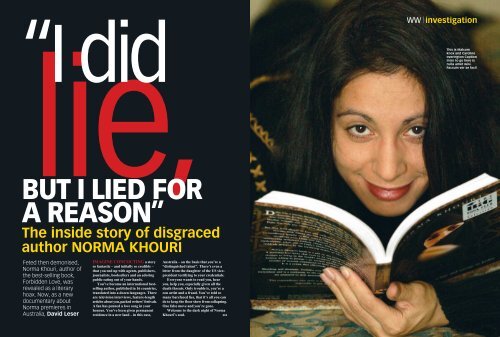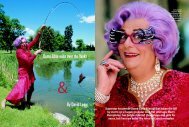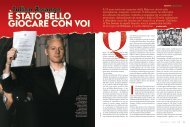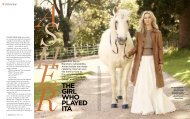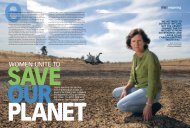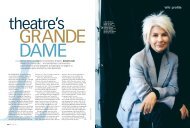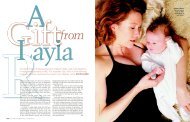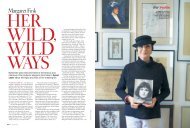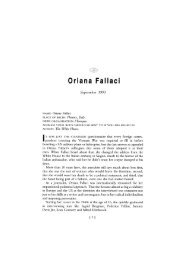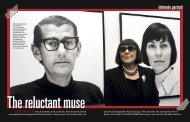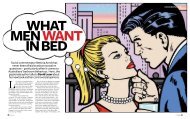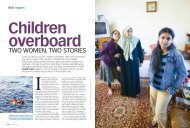The inside story of disgraced author NORMA KHOURI - David Leser
The inside story of disgraced author NORMA KHOURI - David Leser
The inside story of disgraced author NORMA KHOURI - David Leser
You also want an ePaper? Increase the reach of your titles
YUMPU automatically turns print PDFs into web optimized ePapers that Google loves.
“I did<br />
lie,<br />
BUT I LIED FOR<br />
A REASON”<br />
<strong>The</strong> <strong>inside</strong> <strong>story</strong> <strong>of</strong> <strong>disgraced</strong><br />
<strong>author</strong> <strong>NORMA</strong> <strong>KHOURI</strong><br />
Feted then demonised,<br />
Norma Khouri, <strong>author</strong> <strong>of</strong><br />
the best-selling book,<br />
Forbidden Love, was<br />
revealed as a literary<br />
hoax. Now, as a new<br />
documentary about<br />
Norma premieres in<br />
IMAGINE CONCOCTING a <strong>story</strong><br />
so fantastic – and initially so credible –<br />
that you end up with agents, publishers,<br />
journalists, booksellers and an adoring<br />
public eating out <strong>of</strong> your hands.<br />
You’ve become an international bestselling<br />
<strong>author</strong>, published in 16 countries,<br />
translated into a dozen languages. <strong>The</strong>re<br />
are television interviews, feature-length<br />
articles about you, packed writers’ festivals.<br />
A fan has penned a love song in your<br />
honour. You’ve been given permanent<br />
residence in a new land – in this case,<br />
Australia – on the basis that you’re a<br />
“distinguished talent”. <strong>The</strong>re’s even a<br />
letter from the daughter <strong>of</strong> the US vicepresident<br />
testifying to your credentials.<br />
Everyone wants to read you, hear<br />
you, help you, especially given all the<br />
death threats. Only trouble is, you’re a<br />
con artist and a fraud. You’ve told so<br />
many barefaced lies, that it’s all you can<br />
do to keep the floor show from collapsing.<br />
One false move and you’re gone.<br />
Welcome to the dark night <strong>of</strong> Norma<br />
Khouri’s soul.<br />
Australia, <strong>David</strong> <strong>Leser</strong> <br />
WW | investigation<br />
This is Malcom<br />
knox and Caroline<br />
overington Caption<br />
Intro to go here is<br />
nulla amet wisi.<br />
Faccum ver se facil<br />
2 | WW MARCH 2007 WW MARCH 2007 | 3
You remember her, don’t you? <strong>The</strong><br />
woman whose stirring account <strong>of</strong> her<br />
best friend’s honour killing caused such<br />
a sensation here four years ago – 200,000<br />
books sold in Australia alone, voted by<br />
readers as one <strong>of</strong> their 100 all-time<br />
favourite books.<br />
Perhaps it was the timing – two years<br />
after September 11, three years after<br />
a series <strong>of</strong> rapes by Lebanese gang<br />
members in Sydney – that inspired so<br />
much interest about a woman’s place<br />
in the Arab world.<br />
Here was the “harrowing true <strong>story</strong>” <strong>of</strong><br />
“Dalia”, a Jordanian Muslim who had been<br />
murdered by her father for having an illicit<br />
relationship with “Michael”, Catholic man.<br />
She had been stabbed 12 times in the chest<br />
for daring to fall in love with this Royal<br />
Jordanian Army <strong>of</strong>ficer, whom she had met<br />
while working with Norma in a unisex hair<br />
salon in the Jordanian capital, Amman.<br />
Her barbaric killing was <strong>of</strong> a kind<br />
regularly visited on women in the Middle<br />
East and Jordan in particular. Women could<br />
be killed for losing their virginity through<br />
rape or, in Dalia’s case, a few stolen kisses<br />
in a pine forest. Anything that violated the<br />
family’s honour could result in death.<br />
Norma’s book, Forbidden Love, was<br />
an attempt to try to avenge her friend’s<br />
This is Malcom knox and Caroline<br />
overington Caption Intro to go<br />
here is nulla amet wisi. Faccum ver<br />
se facil ute core core tie modiam,<br />
murder, while at the same time, issuing a<br />
worldwide call to action against this ancient<br />
practice. “I made Dalia a promise that her<br />
death would not be in vain,” she told <strong>The</strong><br />
Weekly in 2003, when this magazine – like<br />
many other publications – chose to highlight<br />
her extraordinary tale. (<strong>The</strong> Weekly<br />
published an interview with Norma, along<br />
with a six-page extract from the book.)<br />
“As long as those laws continue to exist<br />
and as long as women continue to be killed<br />
and men get <strong>of</strong>f, I cannot rest,” she said.<br />
By her own account, Norma fled<br />
Jordan after Dalia’s death in 1996 and<br />
went to live in Greece, where, between<br />
housekeeping jobs, she wrote her<br />
best-seller in an internet cafe. She<br />
was snapped up by a New York literary<br />
agent and an international publishing<br />
house, and by the second half <strong>of</strong> 2003,<br />
her book was a runaway success. She<br />
began appearing on network television<br />
in America and at literary festivals<br />
around the world, including Australia<br />
and New Zealand. She had become the<br />
literary diva <strong>of</strong> the year.<br />
I<br />
first met Norma Khouri in May<br />
2003, when I was invited to chair<br />
several panels at the Auckland<br />
Writer’s Festival. One <strong>of</strong> the<br />
panels was about the art <strong>of</strong> writing<br />
memoirs and how these personal<br />
stories helped us understand political issues.<br />
Norma was one <strong>of</strong> the three women on the<br />
panel, the other two being Kim Mahood,<br />
the Australian writer and visual artist, and<br />
Aminatta Forna, the London-based writer<br />
and broadcaster from Sierra Leone.<br />
Norma was quite clearly the star attraction,<br />
despite her being the least gifted <strong>of</strong> the three<br />
writers. Her <strong>story</strong> was dramatic, racy and<br />
it played well to people’s prejudices about<br />
Islam and backward, patriarchal Arab men.<br />
I had met Norma the night before our<br />
interview and we’d hit it <strong>of</strong>f immediately.<br />
She was warm and ebullient, and her <strong>story</strong><br />
quite clearly sensational. It reminded me<br />
<strong>of</strong> why I’d been so drawn to the Middle<br />
East as a young correspondent during<br />
the 1980s. <strong>The</strong> region held everything<br />
for me – desert traditions, messianic faiths<br />
and ancient conflict.<br />
Over dinner and a bottle <strong>of</strong> wine,<br />
Norma and I talked for nearly five hours<br />
about the tragedy <strong>of</strong> her life in Jordan<br />
and about her campaign to save other<br />
women from fates similar to Dalia’s. “I<br />
hardly sleep,” she said, talking non-stop<br />
and smoking obsessively. “I have women<br />
writing to me begging me to help them.<br />
I sit up all night answering their emails.”<br />
She talked about how much she<br />
missed her family in Jordan, particularly<br />
her mother, but how she believed she<br />
would be killed if she returned to her<br />
country. She had dishonoured the family<br />
by running away and speaking out.<br />
“I can’t go back,” she said.<br />
I was amazed by her fluency in English<br />
and her seeming sophistication with all<br />
things Western. How did she speak<br />
English so well? “Private American<br />
schools in Jordan,” she replied. And<br />
what <strong>of</strong> her exposure to Western art,<br />
music and cinema? “Oh, my God,” she<br />
gushed like a child. “I became a movieholic<br />
when I first got to Greece.<br />
“<strong>The</strong> friends I was staying with at the<br />
time said to me, ‘Have you seen the movie<br />
<strong>The</strong>re’s Something About Mary’?” And I<br />
said, ‘That’s one <strong>of</strong> the dumbest movies<br />
I’ve ever seen. It didn’t make any sense.’ But<br />
that was because, in Jordan, the American<br />
movies we saw lasted only 40 minutes. So<br />
when they showed me Something About<br />
Mary I watched it three times in a row and<br />
I couldn’t stop laughing. And I thought,<br />
‘Oooh … all the other movies, what have<br />
I been missing?’ ”<br />
It was at this point that I asked her<br />
whether she had ever had a lover. She<br />
was 34 years and had lived almost her<br />
entire life in the <strong>of</strong>ten harsh and puritanical<br />
world <strong>of</strong> the Middle East. Had she ever<br />
known what it meant to be loved?<br />
“No,” she replied s<strong>of</strong>tly. “<strong>The</strong>re was a<br />
man in Greece who I liked and we would<br />
kiss and he would hold me … but nothing<br />
more.” She was quite clearly claiming to<br />
be an Arab virgin.<br />
Three months later, when I interviewed<br />
her again at the Byron Bay Writers Festival<br />
in northern NSW, we again returned to<br />
this theme. “Now I’m turning all shades<br />
<strong>of</strong> red,” she replied when I asked, this<br />
time publicly, if she had ever had a sexual<br />
relationship. “I’d like to say that I am<br />
married to the cause, but I have had<br />
some experiences with someone that<br />
I care about deeply.”<br />
<strong>The</strong> audience was enthralled. Here<br />
she was, a standard-bearer for oppressed<br />
women, at once so alone, but so courageous,<br />
stubborn, forthright. At the end <strong>of</strong> the<br />
hour-long session, they applauded for<br />
a full 30 seconds. Many people were<br />
moist-eyed as they joined the queue<br />
to meet her, my own daughter – who<br />
happens to be named Jordan – among<br />
them. Little did we know then that she’d<br />
just misled, exaggerated or lied to us at least<br />
80 times during the previous 60 minutes.<br />
Malcolm Knox, the<br />
literary editor <strong>of</strong><br />
<strong>The</strong> Sydney Morning<br />
Herald, was standing<br />
in his kitchen playing<br />
with his one-yearold<br />
son when the phone rang one morning<br />
in February 2003. <strong>The</strong> call was a tip-<strong>of</strong>f<br />
from a Sydney-based Jordanian alerting him<br />
to information coming out <strong>of</strong> his country.<br />
Two prominent Jordanian women had<br />
become sufficiently concerned about Norma<br />
Khouri’s book to have begun compiling a<br />
dossier on the <strong>author</strong>. This would result in<br />
them asking Norma’s publishers, Random<br />
House, to reclassify her work as fiction, a<br />
request which the publishers rejected.<br />
A full 18 months transpired before<br />
Malcolm Knox was able to write the first<br />
<strong>of</strong> what turned out to be a Walkley Awardwinning<br />
series <strong>of</strong> articles with his colleague,<br />
Caroline Overington. “Norma Khouri is a<br />
fake,” he wrote, “and so is Forbidden Love.<br />
“Khouri’s real name is Norma Majid<br />
Khouri Michael Al-Bagain Toliopoulos and<br />
she only lived in Jordan until she was three<br />
years old. She has a US passport and lived<br />
from 1973 until 2000 in Chicago. She is<br />
married with two children, 13 and 11.<br />
“She has four American siblings and a<br />
mother who are desperate to hear news <br />
“I HARDLY SLEEP. I HAVE WOMEN WRITING TO ME BEGGING ME TO HELP<br />
THEM. I SIT UP ALL NIGHT ANSWERING THEIR EMAILS.”<br />
Caption Intro to go here is nulla amet wisi. Faccum ver se facil ute core core tie<br />
modiam, conulla feugait am, vullut aut diat alisis facili<br />
4 | WW MARCH 2007 WW MARCH 2007 | 5
This is Dr Amal al-<br />
Sabbagh Caption Intro<br />
to go here is nulla<br />
amet wisi. Faccum ver<br />
se facil ute core core<br />
tie modiam, conulla<br />
from her. But she has managed to conceal<br />
this double life from her publishers, her<br />
agent, lawyers in several continents, the<br />
Australian Department <strong>of</strong> Immigration<br />
and, until now, the public.”<br />
<strong>The</strong>re was more to come. Norma had fled<br />
the US in 1999 with her Greek-American<br />
husband, John Toliopoulos, to avoid being<br />
questioned by the FBI and prosecuted for<br />
fraud. In 1998, she had been arrested for<br />
allegedly bashing her mother-in-law and<br />
threatening to kill her. (<strong>The</strong> charges were<br />
dropped only when her mother-in-law<br />
failed to show up at the trial.) At the time<br />
<strong>of</strong> Dalia’s so-called honour killing – when<br />
Norma wrote she was living in Jordan –<br />
she was working on various real estate<br />
transactions in the Chicago area.<br />
Further revelations continued to flow<br />
with the help <strong>of</strong> the two Jordanian women<br />
– Rana Husseini, a prominent journalist,<br />
and Dr Amal al-Sabbagh, director <strong>of</strong> <strong>The</strong><br />
Jordanian National Commission for<br />
Women. <strong>The</strong> two had discovered 73 lies<br />
or exaggerations in the book, among them<br />
that the unisex salon – which Norma and<br />
Dalia had supposedly worked in during<br />
the early to mid-1990s – could never have<br />
existed by law, nor could it be remembered<br />
by any hairdresser in the capital.<br />
Within 48 hours <strong>of</strong> Malcolm Knox’s<br />
revelations, Norma was on a flight to New<br />
York, leaving behind her young children in<br />
the care <strong>of</strong> neighbour and friend Rachel<br />
Richardson. By the end <strong>of</strong> the week, her<br />
book had been removed from the shelves.<br />
On August 8, 2004, I received a fivepage<br />
fax from Norma in the US informing<br />
me that her solicitors were holding<br />
documents and photos proving she had<br />
been in Jordan between 1973 and 2000.<br />
She included in the fax the results <strong>of</strong> a<br />
voluntary polygraph test which confirmed,<br />
she said, that she had been telling the truth.<br />
(One <strong>of</strong> the questions asked: “Do you<br />
have reason to believe that your friend<br />
Dalia’s death was an honour killing?”)<br />
Norma also said she was suing Malcolm<br />
Knox for defamation – the suit has since<br />
been dropped – and insisted to me that<br />
Dalia had been a “very close friend” <strong>of</strong><br />
hers who really “did exist” and really had<br />
been “killed by her father”.<br />
“I really do wish I could sit down with<br />
you,” she wrote, “and show you everything<br />
and one day soon I will. But for now, unlike<br />
Malcolm Knox, I must first safeguard the<br />
privacy and safety <strong>of</strong> others involved.”<br />
By this stage – polygraph or no polygraph<br />
– I didn’t believe a word she was saying.<br />
When Anna<br />
Broinowski, the<br />
Australian filmmaker,<br />
first read<br />
about Norma in<br />
July 2004, her<br />
first reaction was to assume that she<br />
had been seriously maligned.<br />
“I had this feminist line running in my<br />
head,” she tells <strong>The</strong> Weekly now, “that this<br />
was a typical witch-hunt … with mostly male<br />
journalists out to make her look evil. That’s<br />
why I thought I would make this film.”<br />
In May 2005, she paid for Norma to fly to<br />
San Francisco from an unknown destination<br />
in the US, principally to attend the premiere<br />
<strong>of</strong> her latest film, Helen’s War – a<br />
documentary about her dissident aunt, the<br />
anti-nuclear campaigner Helen Caldicott.<br />
Anna hoped the film would convince<br />
Norma to co-operate with her. It did.<br />
For the next 18 months, the two worked<br />
together – in America and Jordan – with<br />
Anna hoping not just to vindicate Norma,<br />
but also hoping to alert the world further to<br />
the horrors <strong>of</strong> honour killing. Over time, she<br />
began to seriously doubt Norma’s word.<br />
In August 2004, <strong>The</strong> Sydney Morning<br />
Herald had revealed that Norma’s worst<br />
crime had been, not the literary hoax, but<br />
the theft <strong>of</strong> US government bonds worth<br />
more than half a million dollars. <strong>The</strong>y had<br />
belonged to Norma’s demented 89-year-old<br />
neighbour, Mary Baravikas, and she had<br />
stolen them from her safety deposit box, along<br />
with $42,500 in cash. She had also managed<br />
to have signed into her name Mary’s home.<br />
Later, it was alleged, she had used some <strong>of</strong><br />
this money to have her breasts enhanced.<br />
“I REALLY DO WISH I COULD SIT DOWN WITH YOU AND SHOW YOU<br />
EVERYTHING AND ONE DAY SOON I WILL. BUT FOR NOW … I MUST<br />
Predictably, Norma told Anna that it<br />
wasn’t her fault, that it was her mother-inlaw<br />
and husband, John Toliopoulos, who<br />
had forced her at gunpoint to forge Mary’s<br />
signature. She said he had abused her<br />
physically and emotionally for years.<br />
“I have a criminal record for attacking<br />
her?” John Toliopoulos asked Anna<br />
Broinowski when she put the accusations<br />
to him in Brisbane. “Not <strong>of</strong> my awareness.”<br />
(John Toliopoulos is believed to still be<br />
living in Australia.)<br />
In Jordan, Norma finally admitted to<br />
Anna that there was no friend called Dalia<br />
who had been stabbed by her father in<br />
Amman in 1996. Norma, we need some<br />
pro<strong>of</strong>. We want a name. Where killed?<br />
How killed? When killed? Rather, it was a<br />
woman with a different name, who had been<br />
shot by her brother while pregnant. <strong>The</strong><br />
murder had taken place in 2001 and not in<br />
Amman, but in another Jordanian city. Even<br />
this would prove to be another false trail<br />
Norma had laid. After 300 hours <strong>of</strong> footage,<br />
Anna could no longer separate fact from<br />
fiction. She was utterly exhausted.<br />
“I don’t know that I am sane even<br />
now,” she says wearily. “<strong>The</strong> reason I was<br />
immediately a believer in Norma is that I<br />
had all <strong>of</strong> the white noise <strong>of</strong> the media in<br />
my head – ‘She’s evil, she’s manipulative,<br />
she’s a con woman’ – and she did it<br />
brilliantly [con us].<br />
“When I met her, she opened the door<br />
and she was the antithesis <strong>of</strong> anything I’d<br />
ever expected. She was vulnerable. She<br />
was self-deprecating. She was gentle. She<br />
was compassionate. She was generous.<br />
She was utterly sweet and slightly <br />
6 | WW MARCH 2007 WW MARCH 2007 | 7
Caption Intro to go here is nulla amet wisi. Faccum ver se facil ute core core tie<br />
modiam, conulla feugait am, vullut aut diat alisis facili<br />
frail. And beautiful. And I looked at her<br />
and just wanted to hug her. I just thought,<br />
‘Oh, you poor wounded creature.’<br />
“I immediately felt like I had to be<br />
some kind <strong>of</strong> saviour to her. And then,<br />
<strong>of</strong> course, I film her for a year-and-a-half<br />
and she cons us, too. And I don’t mind<br />
that. I don’t feel angry or betrayed or hurt<br />
because she gave us an amazing <strong>story</strong>.<br />
“I’m just annoyed on her behalf and on<br />
behalf <strong>of</strong> the cause that she didn’t prove<br />
Dalia existed because we would have<br />
really helped the issue <strong>of</strong> honour crimes<br />
and her campaign, if she’d done that.”<br />
Sally Regan, Anna’s producer, believes<br />
Dalia was never going to be found because<br />
she existed only <strong>inside</strong> the silhouetted<br />
corridors <strong>of</strong> Norma Khouri’s mind.<br />
“I think Dalia is part <strong>of</strong> Norma,” she<br />
says. “I think she is the inner, wounded<br />
child, although I can’t prove that in any<br />
way, shape or form.”<br />
Perhaps not, yet there is good reason to<br />
posit such a theory. Norma told Anna that<br />
from the age <strong>of</strong> four, her father, Majid<br />
Bagain, had sexually abused her and that<br />
this “sexual perversity” had continued for<br />
14 years. It only stopped when she filed<br />
charges against him and he was arrested.<br />
Another lie? Who can say for sure?<br />
According to Anna, Norma’s father pleaded<br />
guilty to the charges, but claimed he was<br />
doing so only to spare Norma the shame<br />
and embarrassment <strong>of</strong> a drawn-out court<br />
case. He accused Norma’s mother <strong>of</strong><br />
putting up Norma to the charges because<br />
<strong>of</strong> their faltering marriage.<br />
Anna Broinowski met Norma’s mother,<br />
Asma Bagain, in the same Chicago<br />
neighbourhood that Malcolm Knox doorknocked<br />
back in July 2004. Asma agreed<br />
to speak to Anna, but not for the film.<br />
“She talked with some pride and humour,”<br />
Anna says now, “about the way Norma [as<br />
a young girl] had a little bird that she loved<br />
and how Norma would leave bird seed for<br />
it on all the window ledges. And her mother,<br />
who was working as a nurse, said to her one<br />
day: ‘If that bird seed is still there when I<br />
come home, I’m going to kill it’. And the<br />
bird seed was still there when she got home<br />
… and the mother sort <strong>of</strong> laughed at me and<br />
said, ‘So I went like this’, and she snapped<br />
the bird’s neck in front <strong>of</strong> Norma.” Norma<br />
was seven years old at the time.<br />
Norma Khouri is back in<br />
Chicago, living in the<br />
same working-class<br />
district she was in before<br />
she fled the country<br />
eight years ago. Her<br />
two children are reunited with her, having<br />
been put on a plane by a private investigator<br />
in November 2004.<br />
By all accounts, neither Norma nor the<br />
children have seen John Toliopoulos since<br />
they left Australia. According to Anna,<br />
Norma still owes Rachel Richardson,<br />
her former neighbour on Queensland’s<br />
Bribie Island, $15,000, and her Australian<br />
publishers Random House, as much as<br />
$300,000 for the advance on the nowcancelled<br />
sequel to Forbidden Love.<br />
A first draft <strong>of</strong> the book, entitled Matter<br />
<strong>of</strong> Honour, is said to have been a true account<br />
<strong>of</strong> Norma’s freedom in the West, following<br />
her escape from Jordan. Among her<br />
flourishes with the pen is a description <strong>of</strong><br />
her losing her virginity at the age <strong>of</strong> 36<br />
to a handsome Greek.<br />
Anna Broinowski says Norma is now<br />
studying to become a human rights lawyer.<br />
She says that despite everything, despite the<br />
lies and deception, she can’t help loving her.<br />
“I adore Norma because she’s one <strong>of</strong> the most<br />
charismatic women I’ve ever met and<br />
because her audacity knows no bounds. She<br />
is the modern equivalent <strong>of</strong> Machiavelli.”<br />
I decide to call Norma myself. I want<br />
to know what motivated her to bear such<br />
false witness to so many. Was it really<br />
the issue <strong>of</strong> honour killings, or was it<br />
fame and fortune she was after? Had<br />
she calculated the whole thing from the<br />
beginning or was she improvising on<br />
the run? And did she feel any remorse?<br />
“Of course, I feel remorse,” she replies<br />
when I reach her at home early one morning,<br />
“OF COURSE, I FEEL REMORSE. I’VE ALWAYS SAID I THOUGHT I WAS<br />
DOING SOMETHING FOR THE RIGHT REASON, BUT I DID IT THE WRONG<br />
Australian time. “I’ve always said I thought<br />
I was doing something for the right reason,<br />
but I did it the wrong way.”<br />
What about the money you stole from<br />
Mary Bavarikas? “I didn’t do anything with<br />
Mary Bavarikas. It was John [Toliopoulos].<br />
If I did do something, the federal government<br />
would have taken me into custody.”<br />
As for the money owed to Random<br />
House, Norma insists it was $50,000, not<br />
$300,000, and she’s paid it back. (Random<br />
House has refused to confirm or deny the<br />
amount and whether it’s been repaid. “We<br />
haven’t commented on anything to do with<br />
the Norma Khouri case before and we’re not<br />
going to start now,” Karen Reid, head <strong>of</strong><br />
publicity for the company’s international<br />
book division, told <strong>The</strong> Weekly.)<br />
Similarly, with Rachel Richardson,<br />
Norma says now she never owed her<br />
$15,000. “We are still going over what<br />
she says I owe her, but it’s absolutely not<br />
$15,000. And if you want to talk about me<br />
bearing false witness, politicians do that<br />
all the time and the Jordanian government<br />
has been doing it for 200 years.<br />
“Look, I did lie, but I lied for a reason. It<br />
wasn’t fame and fortune I was after, not at<br />
all. It was about the issue [<strong>of</strong> honour killings].<br />
And I apologise to you for lying. I justified<br />
it in my head as the ends justifying the means.<br />
I hated lying to anyone about anything.”<br />
After 10 minutes <strong>of</strong> frosty conversation,<br />
I thank Norma for her time and for her<br />
apology. I then hear myself wishing her<br />
well in whatever she chooses to do next in<br />
her life. “Thank you,” she says finally. “If<br />
you are ever in Chicago, drop by.”<br />
And then she laughs that coquettish,<br />
slightly embarrassed half-laugh <strong>of</strong> hers<br />
and, absurd though this might sound, I’m<br />
tempted to believe her all over again. ■<br />
Anna Broinowski’s documentary, Forbidden<br />
Lie$, premieres on February 25 at the Adelaide<br />
Film Festival and is due for national release<br />
by Palace Films later this year.<br />
8 | WW MARCH 2007 WW MARCH 2007 | 9<br />
WAY.”<br />
speaks to Norma about<br />
the scandal.<br />
FIRST SAFEGUARD THE<br />
PRIVACY AND SAFETY<br />
OF OTHERS INVOLVED.”


